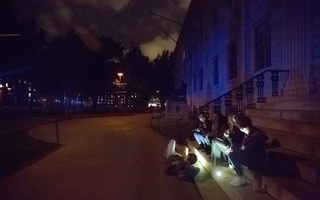"The whole object of radio frequency amplification is to amplify the energy before it gets to the detector," declared Mr. E. B. Dallin in a lecture last night to the Wireless Club at the Cruft High Tension Laboratory. He pointed out that this was essential in securing the maximum of sound without sacrificing clearness. He then diagrammed the various methods of setting up a set by which one can increase the intensity of sound without being troubled by excessive sputtering from the instruments. Mr. Dallin discovered in particular the relative disadvantages of the regenerative, crystal, and reflex receiving outfits, favoring the crystal detector as the best receiver of music. In speaking of the possible strength to which such sets can be developed, he mentioned the fact that Great Britain built a 19-stage regenerative amplifier in the late war which enabled her to hear the German Navy practicing its signal codes in the Kiel canal, while an ordinary instrument could not hav epicked up a message a half mile away. His points, were demonstrated by a set placed in the room by which he got in touch with stations in cities as far away as New York and Schenectady, in spite of the disturbing influence of the storm. To the great surprise of those present, he was able to get remarkable results by putting his fingers on the tapes to which the antenna wires were originally attached, thereby proving that the human body may serve as an antenna under certain conditions.
Read more in News
TENNIS TEAM CHALKS UP FIVE STRAIGHT VICTORIESRecommended Articles
-
Harvard Faculty Council Backs New Undergraduate Stem Cell ConcentrationThe Faculty Council unanimously approved a proposal yesterday for a new concentration focusing on the development and regeneration of the
-
Faust Welcomes 2014 AdmitsHigh school seniors and their families traveled from all regions of the country and the globe to Cambridge this weekend, hoping to sample life at Harvard before making their college decisions.
-
Scientists Research Stem Cell Therapies for Cardiac DamageHarvard Stem Cell Institute researchers may have found a new use for cell therapy in patients with cardiac damage.
-
Phi Beta Kappa Selects 'Senior 48'The Phi Beta Kappa chapter at Harvard College selected its “Senior 48” members of the Class of 2012.
-
 Blackout Disrupts Midterm Studying, Strands Some in Elevators
Blackout Disrupts Midterm Studying, Strands Some in Elevators













